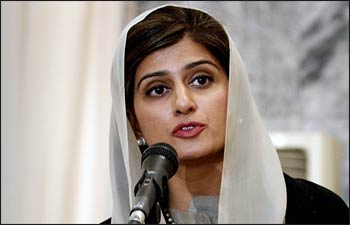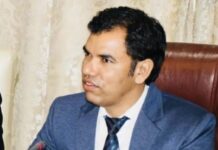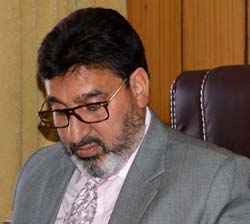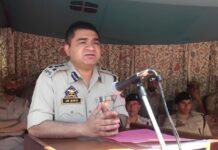SRINAGAR: Mullah Yaqoob, Afghanistan’s defence minister has rejected Pakistan’s request to meet with the country’s deputy foreign minister Hina Rabbani Khar during the latter’s one-day trip to Afghanistan, the Daily Times reported.

Yaqoob, who is the son of Taliban founder Mullah Muhammad Omar, rejected the meeting amid growing clashes between Pakistan forces and Taliban’s men on the Duran Line, the de facto border separating the two countries. It is being seen as an embarrassing development for Islamabad.
The Pakistani embassy in Kabul had tried to arrange a meeting between Mullah Yaqoob and Hina Rabbani Khar to discuss security issues and bilateral relations. However, it did not materialise.
Hina Rabbani has been the first female foreign minister of any country that visited Afghanistan. However, the no-Hijab-wearing minister, whose dress sense precedes her diplomacy, could not cut much ice in Pakistan’s “strategic depth”.
A source close to the Taliban told Afghanistan International that Mullah Yaqoob is “worried” about Pakistan’s policies towards Afghanistan and thus he has asked to express his concern to the Pakistani authorities by not meeting Khar, the Pakistani newspaper Daily Times report stated.
Even though Mullah Yaqoob’s reasons haven’t been made official, but since the Taliban came to power, there have been several border clashes between Pakistani forces and Taliban individuals.
Another source had previously told Afghanistan International news organisation that Mullah Yaqoob is not “satisfied” with Pakistan’s behaviour towards his father Mullah Muhammad Omar, who died in 2013.
Earlier, the Yaqoob was quoted saying that the American drones had entered Afghanistan’s airspace from Pakistan when the war was on in the region.
However, Yaqoob’s decision to not meet the Pakistani minister wasn’t followed by his government colleagues, including deputy Prime Minister Abdul Salam Hanafi, who met Khar.
Along with Hanafi, those who met Khar included Interim Foreign Minister Amir Khan Muttaqi, Interim Commerce Minister Haji Nooruddin Azizi, and other senior officials. She also held a meeting with the Women’s Chamber of Commerce of Afghanistan.
No country has yet recognised the Taliban regime in Afghanistan, which overtook the control of the country on August 15, 2021, after the United States withdrew their military after two decades. The former Afghan President Ashraf Ghani fled the country.
Kabul Visit’s Agenda
Islamabad tasked Khar to make the Taliban act against Tehreek-e-Taliban (TTP) militants allegedly carrying out attacks across the border. Khar was flanked by Pakistan’s special representative for Afghanistan Mohammad Sadiq.
Pakistan Foreign Office (FO) said, “A range of bilateral issues of common interest, including cooperation in education, health, trade and investment, regional connectivity, people-to-people contacts, and socio-economic projects were discussed. Bilateral trade and economic relations, transit and connectivity were under particular focus. Also discussed mechanisms to oversee cooperation in these areas.”
The visit had come a day after the TTP ended the ceasefire with the Pakistani government and announced the start of nationwide attacks against the Pakistani state.
Mohammad Khurasani, a spokesman for the militant group Tehreek-e-Taliban Pakistan (TTP) told Reuters in a text message that its leadership had decided to end the ceasefire with Pakistan.

A TTP statement urged its fighters to resume attacks in retaliation towards a continuous military campaign against them. The Pakistani military has carried out several offensives against the militants in their strongholds in remote “lawless” districts bordering Afghanistan.
Following this, a TTP suicide bomber targeted a police truck in western Pakistan, killing three and injuring 23 people.
The bomber targeted a police team preparing to escort polio vaccinators to the city of Quetta, according to senior police officials quoted as saying by AFP. A policeman, a woman and a child have been ascertained as the casualties so far.
In the aftermath of the blast, Balochistan Chief Minister Abdul Quddus Bizenjo condemned the attack and said, “All those involved in this incident and their facilitators will be brought under the law.”
The talks between the government and TTP collapsed in August as the former attempted to rein in the “home-grown monster”. During the negotiations, TTP refused to budge on its demand for the reversal of the merger of Federally Administered Tribal Areas with the Khyber Pakhtunkhwa province.

ISIS Attack?
Meanwhile, AFP reported that the terror group ISIS has staked the claim for an attack on Pakistan’s embassy in Kabul. A security guard was reported to have been injured in the attack that Islamabad termed an “assassination attempt”.
Islamabad has asked Kabul to secure its diplomatic staff and investigate the attack. Kabul Police claimed to have rounded up a suspect and seized two light weapons.
The relations between Islamabad and Kabul are not good even though the former is being accused of supporting the Taliban. Almost a million odd Afghans still live in neighbouring Pakistan as refugees. Pakistan keeps its Kabul mission open even though it is yet to recognise the Taliban government.
While Pakistan has made efforts to smooth over the growing rift, reopening a key border crossing at Spin Boldak-Chaman closed following cross-border gunfire that killed a Pakistani security guard on November 13, and sending its minister of state for foreign affairs on an official visit to the Afghan capital, there are clear signs that Pakistan’s leverage with the Afghan Taliban seems to be slipping fast. Many influential voices in Pakistan now say they should avoid seeing Afghanistan as their country’s “strategic depth”.















